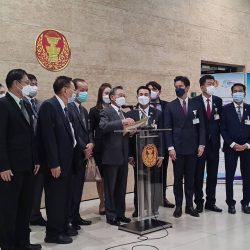Effective waste management starts with ‘environmental awareness’
– The destiny –
In 1979, Werner Kossmann set foot in Thailand for the first time. “It was like destiny”, he said with a smile.
This country wasn’t, however, in his itinerary at all. Back then, while studying for his bachelor’s degree in agriculture, he joined a volunteer service program and was assigned to work for 2 years at the Nongpho Dairy Cooperative in Ratchaburi. Since then, he has been working on and off in Thailand.
At the moment, he is a Project Director of integrated waste and wastewater management for GHG reduction, GIZ Thailand. His organisation cooperates with the Pollution Control Department (PCD) to work on the National Roadmap on food waste, a result of Thailand’s commitment to the UN 2030 agenda to reduce food waste by 50% by 2030.
– Environmental awareness –
“You should start food waste reduction at the time when you think about food. So, it has a lot to do with awareness and I think this is what we have to work on at the very beginning, to make people aware that, when we buy food, we should make sure that we can also eat it all”.
Many people would never have imagined that food waste, or leftovers from their plates, could have a major climate change affect.
As much as 40% of the rubbish in landfills is food waste, “it is normally put into plastic bags and then, every day, it is collected by the garbage truck and brought to the landfill to be disposed of. What happens in the landfill, because it is organic material, is it decomposes and the landfill is mainly without oxygen going into it. It is compressed and covered with soil. So, when organic material decomposes without oxygen, it creates a gas, which is called methane, and methane is a climate killer, actually. It has a global warming potential which is about 25 to 30 times higher than CO2, or carbon dioxide”, Werner explained.
He added that “If we are able to reduce methane emissions into the atmosphere, we can do a lot to save the climate in a way that will reduce global warming”.
– Circular economy is the key –
Recently, global warming has had catastrophic impacts in many parts of the world. England has officially declared a drought in eight areas of the country. This natural disaster followed the most extreme heat on record, as the temperature reached 40°C. People are being advised to ‘rethink their water use’. A few months prior, NewBrew, a brainchild of Singapore, was launched. This craft beer is made from recycled toilet water, which is purified at the big sewage treatment plant.
“They do this because the price of water is very high in Singapore. So it’s worth investing in this kind of technology. Though it’s not cheap, they have no choice, because they have only a limited amount of water. So, instead of, for example, drilling very deep water wells, to get access to water, which is also very expensive, they’re reusing the water which they have already used, recycling it and then using it as drinking water again”, Werner pointed out.
He added that Singapore actually uses the circular economy for water, which should be the ultimate goal for everything. “With every resource, we should recycle it for as long as possible, including water”.
Like many other countries, Thailand has also moved to a more sustainable policy. The Bio-Circular-Green-Economy (BCG) is a national agenda, launched by Prime Minister Prayut Chan-o-cha’s government, which aims to increase the share of BCG’s GDP from 3.4 trillion baht in 2020 to 4.4 trillion baht in 2025.
Basically, the BCG strategic plan focuses on different sectors and tries to design products and systems in a way which will support circularity.
“That means the raw material can be kept in the circle. So, that means waste management actually should not be very big issue anymore. With most products being recycled, reused or whatsoever, the waste left over is only a small amount”.
– Thailand: Like and dislike –
When asked what he likes most about Thailand, he said that it’s the country’s wonderful natural heritage, the food and the people. “What attracts me more is the friendliness and respectfulness of the people. Whenever you meet Thai people and talk to them, the first thing you see is that they are friendly, and this actually makes it easy for you to open up and start a conversation”.
Then we wanted to know what he dislikes about this country. Werner replied promptly, “I get annoyed every time when I see people wearing no helmets on motorbikes, even with kids and, at the same time, you read that Thailand has the highest accident rate and road deaths in the world, or one of the highest. I asked myself why. These people are educated, they go to universities, they can read and write, why are they not putting their helmets on?”
Werner admitted that, despite living in this country for over 30 years and getting used to the Thai way of living, he still doesn’t understand the logic behind the behavior of reckless motorcyclists who ride without helmets.
“When it comes to a really serious threat to life, you should think differently. So, this is maybe what I don’t like so much about Thailand”.
By Jeerapa Boonyatus






